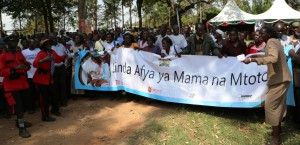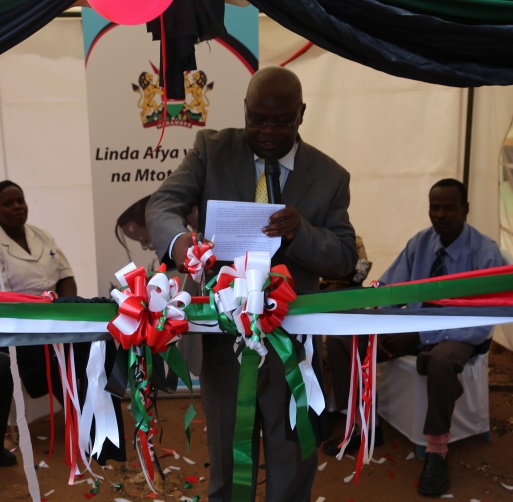Field Stories
WATCH: Mother-to-mother support groups show the power of peer support
July 11, 2024
MI and Partners Launch “Linda Afya ya mama na Mtoto” in Mumias District of Kenya
MI is working in partnership with the Kenyan Ministry of Health, AMREF, PRONTO and the University of Nairobi to improve maternal and newborn health and nutrition in the Kakamega Central, Mumias and Matungu districts of Kakamega County.
Posted on July 4, 2013


Thousands of people, colourful dancing and theatre performances and deafening ululations – it was an amazing scene at the community launch of the “Linda Afya ya mama na Mtoto” maternal and newborn health and nutrition project in Bukaya,in the Mumias district of Kakamega County in Western Kenya.
Community celebration was a must as a new project was introduced that has the potential to save and improve the lives of the district’s women and children.
Western Province has a very high rate of infant mortality, at 65 per 1000 live births, much higher than the national average of 48 per 1000 live births and many women are delivering their babies at home, with untrained support.
The majority of women in Kenya also don’t receive any sort of antenatal care in their first trimester of pregnancy and the quality of services varies widely throughout the pregnancy period, putting women and their newborns at risk of serious illness, lifelong debilitation, or death. Poor nutritional status going into and throughout pregnancy amplifies these risks.


MI is working in partnership with the Kenyan Ministry of Health, AMREF, PRONTO and the University of Nairobi to improve maternal and newborn health and nutrition in the Kakamega Central, Mumias and Matungu districts of Kakamega County through “Linda Afya ya mama na Mtoto”.
Specifically, the organization is working to achieve the following priority objectives:
“This project is very useful to us in Mumias District,” said Dr Arthur Andere, the District Medical Officer of Health at the launch event. “We have very low maternal ante-natal clinic attendance and we are very optimistic that this CBMNH project will have more women seek health services.”
The initiative, funded by the Government of Canada, will reach more than 29,000 pregnant women, as well as community health workers, traditional birth attendants, health care providers at front-line facilities and community organizations.
Partners are also engaging community health committees and local civil society organizations to promote good maternal and newborn health and nutrition, and the importance of seeking such services at a health facility.
If women can be reached earlier and more often throughout pregnancy with nutrition education and interventions, health monitoring and services, there is a greater chance of healthier and safer pregnancies and births.
Through training, increasing key supplies for such things as high-risk births, and providing information to pregnant women and their communities, MI and its partners are improving the lives of pregnant women and their newborns.